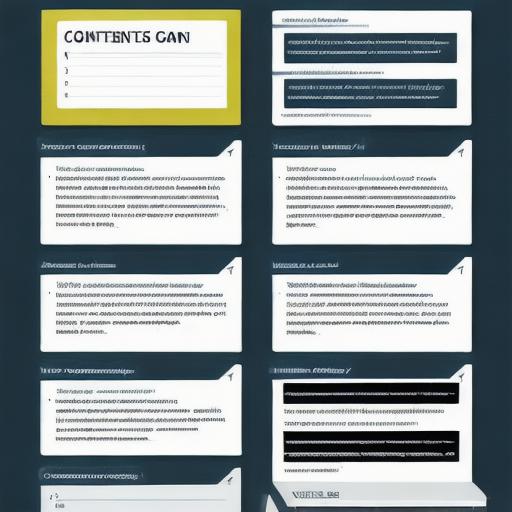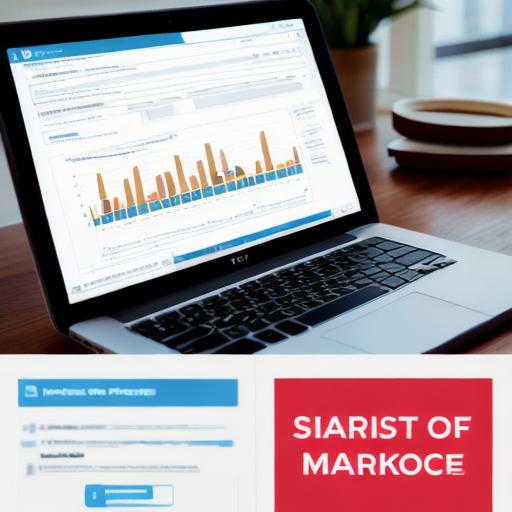The Ultimate Guide to Effective Marketing Tools for Small Businesses: A Comprehensive Analysis and Comparison
In today’s highly competitive business landscape, marketing has become an essential component of any organization’s success strategy. Whether you are a small business owner or a large corporation, having the right marketing tools is crucial to reaching your target audience, increasing brand awareness, and driving sales. In this comprehensive guide, we will explore the most effective marketing tools available for small businesses, taking into account various factors such as budget constraints, resource limitations, and evolving customer preferences.
Table of Contents
1. Introduction
2. Email Marketing: The Power of Personalized Communication
3. Social Media Marketing: Building Brand Awareness and Engagement
4. Search Engine Optimization (SEO): Boosting Visibility and Traffic
5. Pay-Per-Click Advertising (PPC): Targeted Promotion with Maximum ROI
6. Content Marketing: Educating and Inspiring Your Audience
7. Influencer Marketing: Leveraging the Power of Social Proof
8. Video Marketing: A Visual Approach to Engagement
9. Affiliate Marketing: Expanding Your Reach through Partnerships
- Local SEO: Optimizing for Local Search and Maximizing Foot Traffic

11. Comparison of Marketing Tools: A Side-by-Side Look at the Pros and Cons
12. Case Studies and Real-Life Examples: Inspirational Journeys of Successful Small Businesses
13. FAQs: Answering Your Most Pressing Questions
A PLACE FOR A PICTURE #2
14. Conclusion
1. Introduction
Welcome to our ultimate guide on effective marketing tools for small businesses! As a small business owner, you may be juggling numerous tasks and wearing multiple hats, but marketing should not be one of them. With the right tools and strategies in place, you can streamline your marketing efforts and achieve impressive results without breaking the bank.
In this comprehensive guide, we will delve into the world of small business marketing and explore the most effective tools available to help you grow your brand and increase sales. We will discuss various factors that influence customer behavior and preferences, such as personalization, social media, search engine optimization (SEO), pay-per-click advertising (PPC), content marketing, influencer marketing, video marketing, affiliate marketing, local SEO, and more.
We will also provide a side-by-side comparison of these tools, highlighting their pros and cons to help you make informed decisions about which tools are best suited for your business needs. Additionally, we will share real-life examples and case studies of successful small businesses that have utilized these marketing tools effectively.
By the end of this guide, you will have a comprehensive understanding of the most effective marketing tools for small businesses and be equipped with the knowledge and insights needed to develop a successful marketing strategy that drives growth and profitability.
2. Email Marketing: The Power of Personalized Communication
Email marketing is one of the oldest and most effective digital marketing channels, allowing businesses to communicate directly with their target audience. With email marketing, you can send personalized messages to your subscribers based on their interests, behaviors, and preferences, building stronger relationships and increasing engagement and loyalty.
Benefits of Email Marketing
- Cost-effective: Email marketing is an inexpensive way to reach a large audience, with low costs associated with sending emails and maintaining email lists.
- High ROI: Studies show that email marketing has one of the highest return on investment (ROI) of any digital marketing channel, with an average of $42 for every dollar spent.
- Targeted communication: Email marketing allows you to segment your audience and send tailored messages to specific groups based on their interests, behaviors, and preferences, increasing the likelihood of engagement and conversion.
- Automation: You can use email automation tools to streamline your marketing efforts, sending automated welcome emails, birthday offers, and abandoned cart reminders, among others.
- Easy to measure: Email marketing provides valuable insights into campaign performance, such as open rates, click-through rates, and conversion rates, allowing you to optimize your campaigns for better results.
Tools and Platforms
There are numerous email marketing tools available in the market, catering to businesses of all sizes and budgets. Some popular options include:
- Mailchimp: A user-friendly platform with a wide range of features, including automation, analytics, and integrations with other marketing tools.
- Constant Contact: A comprehensive email marketing solution with advanced segmentation, automation, and reporting capabilities.
- ConvertKit: A powerful platform designed for content creators and bloggers, offering advanced automation and segmentation features.
- Drip: An all-in-one email marketing tool with a focus on personalization and automation, including ecommerce integrations.
3. Social Media Marketing: Building Brand Awareness and Engagement
Social media is an incredibly powerful tool for small businesses, allowing you to build brand awareness, engage with your audience, and drive traffic to your website. With social media platforms like Facebook, Instagram, Twitter, LinkedIn, and more, you can reach a vast audience and connect with them on a personal level.
Benefits of Social Media Marketing
- Brand building: Social media allows you to build a strong brand identity by sharing engaging content, responding to customer inquiries and feedback, and showcasing your business’s values and mission.
- Audience engagement: Social media enables you to engage with your audience and foster relationships through comments, likes, shares, and direct messages.
- Targeted advertising: Many social media platforms offer targeted advertising options, allowing you to reach specific demographics, interests, and behaviors based on user data.
- Traffic generation: By sharing links to your website on social media, you can drive significant amounts of traffic to your site, increasing visibility and potential conversions.
- Cost-effective: Social media marketing is an affordable way to reach a large audience, with low costs associated with posting content and advertising.
Tools and Platforms
There are numerous social media management tools available in the market, catering to businesses of all sizes and budgets. Some popular options include:
- Hootsuite: A comprehensive social media management platform with scheduling, analytics, and team collaboration features.
* Buffer: A user-friendly social media scheduling tool with analytics and reporting capabilities.
- Sprout Social: An all-in-one social media management solution with advanced analytics, team collaboration, and content curation features.
- Later: A visual social media management tool designed for Instagram and Facebook, focusing on content planning and scheduling.
4. Search Engine Optimization (SEO): Boosting Visibility and Traffic
Search engine optimization (SEO) is the process of optimizing your website and its content to rank higher in search engine results pages (SERPs). With SEO, you can increase your online visibility, attract more organic traffic to your site, and improve your chances of converting visitors into customers.
Benefits of SEO
- Organic traffic: SEO focuses on attracting organic, targeted traffic to your website, which is more likely to convert into paying customers.
- Cost-effective: Unlike paid advertising, SEO is a long-term strategy that can provide significant returns on investment over time.
- Improved user experience: By optimizing your website for search engines, you can also improve the overall user experience, making it easier for visitors to find and engage with your content.
- Brand credibility: A well-optimized website can enhance your brand’s credibility and authority in your industry, increasing trust and confidence among potential customers.
Tools and Platforms
There are numerous SEO tools available in the market, catering to businesses of all sizes and budgets. Some popular options include:
- Google Analytics: A free web analytics service that tracks website traffic and provides valuable insights into user behavior and campaign performance.
- Ahrefs: A powerful SEO tool that offers keyword research, backlink analysis, and content optimization features.
- SEMrush: An all-in-one SEO solution with a focus on keyword research, competitor analysis, and site auditing.
- Moz: An SEO software suite that includes keyword research, link analysis, and content optimization tools, among others.
5. Content Marketing: Building Authority and Engagement
Content marketing is the process of creating and sharing valuable, relevant, and consistent content to attract and retain a clearly defined audience, ultimately driving profitable customer action. With content marketing, you can build authority in your industry, engage with your target audience, and establish yourself as a thought leader in your field.
Benefits of Content Marketing
- Authority building: By creating high-quality, informative content, you can establish yourself as an expert in your industry and build trust among potential customers.
- Audience engagement: Content marketing allows you to engage with your target audience through blog posts, infographics, videos, and more, fostering relationships and increasing brand loyalty.
- Lead generation: By offering valuable content in exchange for contact information, you can generate leads and nurture them through the sales funnel.
- SEO support: High-quality content can improve your search engine rankings, driving more organic traffic to your website.
- Cost-effective: Content marketing is an affordable way to reach a large audience, with low costs associated with creating and distributing content.
Tools and Platforms
There are numerous content marketing tools available in the market, catering to businesses of all sizes and budgets. Some popular options include:
- HubSpot: An all-in-one marketing, sales, and service platform that includes content creation, scheduling, and analytics tools.
- Yoast SEO: A content optimization tool that helps improve your website’s search engine rankings through keyword research, on-page analysis, and content optimization features.
- Canva: A user-friendly graphic design tool that allows you to create professional-looking visual content for your blog posts, social media, and other marketing channels.
- Google Docs: A free word processing and collaboration platform that allows you to create and share content with your team members and stakeholders.
6. Influencer Marketing: Leveraging Social Proof
Influencer marketing is the process of partnering with social media influencers or content creators to promote your brand and its products or services. By collaborating with influencers, you can tap into their audience and leverage their credibility and influence to drive traffic, engagement, and conversions.
Benefits of Influencer Marketing
- Social proof: Influencer marketing allows you to leverage the social proof of popular content creators and influencers, increasing trust and credibility among potential customers.
- Targeted reach: Influencers often have highly engaged audiences that align with your target demographics, allowing you to reach a specific group of people more effectively.
- Cost-effective: Influencer marketing can be an affordable way to reach a large audience, with lower costs associated with traditional advertising channels.
- Content amplification: By partnering with influencers, you can amplify your content and increase its visibility, driving more traffic and engagement.
Tools and Platforms
There are numerous influencer marketing platforms available in the market, catering to businesses of all sizes and budgets. Some popular options include:
- Influencer.co: A comprehensive influencer marketing platform that connects businesses with influencers across various industries and niches.
- HypeAuditor: An influencer marketing tool that provides data on influencers’ engagement rates, reach, and authenticity, helping businesses make informed decisions about partnerships.
- BuzzStream: A social media outreach and influencer marketing tool that allows businesses to connect with influencers and manage their relationships more effectively.
- Upfluence: An all-in-one influencer marketing solution that includes content creation, analytics, and campaign management features.
7. Conclusion
In conclusion, the most effective marketing tools for small businesses depend on your specific goals, target audience, and budget. By leveraging a combination of these strategies, you can build brand awareness, generate leads, and drive sales more effectively. Remember to track your campaign performance regularly and adjust your approach as needed to optimize your results and achieve long-term success.




